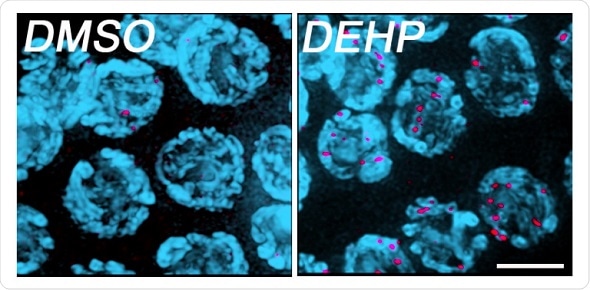A new study published 9th January in PLOS Genetics by Mónica Colaiácovo of Harvard Medical School and colleagues reports that the most commonly used plasticizer, diethylhexyl phthalate (DEHP), leads to fertility problems by causing an excess number of breaks in the DNA during egg production, and then interfering with the repair systems that fixes the breaks.

High-resolution images show excess DNA double-strand breaks formed in DEHP-exposed nuclei destined to become egg cells. Mid-pachytene nuclei (chromosomes in blue) in germlines dissected from control (DMSO) and DEHP-exposed worms. Sites where DNA double-strand breaks have occurred are marked in magenta (RAD-51 antibody). Scale bar, 3 mm. Image Credit: This image was created by Luciann Cuenca, Department of Genetics, Harvard Medical School.
About four million tons of DEHP is produced each year to manufacture plastics and people encounter the chemical through toys, clothing, food packaging, flooring and personal care products. Numerous studies have shown that exposure to DEHP causes a variety of fertility problems in both men and women, but no one knew exactly how the chemical exerts its harmful effects. In the current study, researchers exposed the roundworm C. elegans to low levels of DEHP found in the environment and looked to see how it impairs egg production. They show that the chemical causes increased double-strand breaks in the DNA during the cell division process that occurs during egg production and hampers DNA repair systems. The resulting chromosomal defects can lead to incorrect numbers of chromosomes and later problems with embryonic development.
We were excited to find that [DEHP affects chromosomes] in part by altering chromatin, as suggested by increased length of a structure built on chromosomes during the production of eggs and sperm. Our studies link this alteration to increased levels of DNA double-strand breaks and impaired ability to properly repair these breaks. This underscores the importance of identifying better alternatives for replacing DEHP. Our future plans involve expanding our analysis to understand the effects of other phthalates and compare this to available (green chemistry) alternatives.”
Mónica Colaiácovo, author, Harvard Medical School
The findings provide new insights into how environmentally relevant levels of DEHP impair the process of making eggs and sperm in animals. When coupled to the large body of existing research on DEHP and reproductive problems, the results highlight the need to reduce the use of DEHP as a common plasticizer or to find alternative and safer substitutes that will minimize the risk of human exposure.
Source:
Journal reference:
Cuenca, L., et al. (2020) Environmentally-relevant exposure to diethylhexyl phthalate (DEHP) alters regulation of double-strand break formation and crossover designation leading to germline dysfunction in Caenorhabditis elegans. PLOS Genetics. doi.org/10.1371/journal.pgen.1008529.